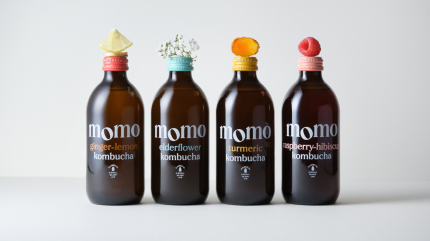
UK-based Momo Kombucha is aiming to become profitable next year after securing £1m ($1.25m) in a fundraising round.
Momo has raised around £2.5m in total funding since its inception in 2018, with the latest cash set to primarily support “scaling up the production process” and improving efficiency, co-founder Josh Puddle told Just Drinks.
The kombucha maker is targeting £3m in revenue for its financial 2024, compared to £1.35m in 2023. It is aiming for flat EBITDA this year after posting a loss in 2023.
Puddle said: “We should have brought our losses down quite substantially from last year. And then next year, we’re looking to do £6m of revenue and we’re looking to be profitable at that level.”
Puddle said the “biggest chunk”, around £400,000, of its funding will go towards equipment. “That is largely for the scale-up of the production process, and to try and make us more efficient,” he added.
“We have recently bought an automated bottling line, but we’re thinking about maybe having to buy a second one just because we’re growing so fast.”

US Tariffs are shifting - will you react or anticipate?
Don’t let policy changes catch you off guard. Stay proactive with real-time data and expert analysis.
By GlobalDataHe said he is aiming to produce 120,000 330ml bottles a week during the peak summer months in 2026. Currently, the company can produce around 2,000 bottles an hour and its record (in January) is 22,000 bottles in one week.
Puddle, who founded Momo with his wife Lisa following a trip to the US in 2016, added that the business is partially relocating in and around its site in London.
“So we’re currently over three premises at the site but we’re about to move out of two of the railway arches and into a much larger warehouse. That warehouse will be for fruit storage, other storage and offices, and then where the brewery is, we will also be expanding that premises.”
Momo Kombucha marketing, sales push
Finally, the fresh funding will help beef up what Puddle described as a “very lean business on the sales and marketing side”.
He said: “Ultimately, we’ve always been a bit held back from really pushing the sales and marketing because of our production capacity constraint.
“So it’s sort of like a double-edged sword: our production process is the reason that the brand’s been doing well and the drinks are popular, but it’s also the thing that’s holding us back because, unlike a lot of the challenger brands which outsourced manufacturing where you can kind of double, triple or quadruple production quite easily, for us it’s more premises, more tanks, more space, more chillers, you know, and all the rest of it.”
Josh and Lisa Puddle have a joint shareholding of 64% of Momo, with angel investor Jess Coles owning 17% and the remaining circa 20% split between 15 investors. It employs 16 people, which has doubled since last year.
The kombucha company is listed in Selfridges, Planet Organic, Whole Foods, online retailer Ocado and a handful of “specialty coffee shops” like Gail’s, where it recently secured a listing. Its range has an RRP of £3.99 per bottle.
Around 25% of sales are direct to consumer. Puddle said: “That part of the business, I actually think we’ve kind of under-invested in so far, and I think there’s a big opportunity for that to grow.
“Kombucha lends itself very well to D2C because obviously, it is still a reasonably expensive product, but for customers that are able to commit to a monthly order we can deliver in bulk and they can get decent savings there. For customers that are drinking it for that gut health benefits, it’s always in the fridge.”
He added that the UK is Momo’s priority and the business is not currently looking at export markets, as the brand aims to “become the UK’s number one kombucha”.
“My sense is that kombucha is more established in the UK than elsewhere in Europe. And it’s still, you know, very, very niche and pretty small here so I think the market currently in Europe is very small,” he said.
“But ever since I started the business, I’ve always said kombucha will become a big category in the UK and western Europe. You can see what’s happened in the US and Australia. And I think with the big macro trends of gut health, low sugar, soft drinks and alcohol alternatives, they’re not going anywhere.”




